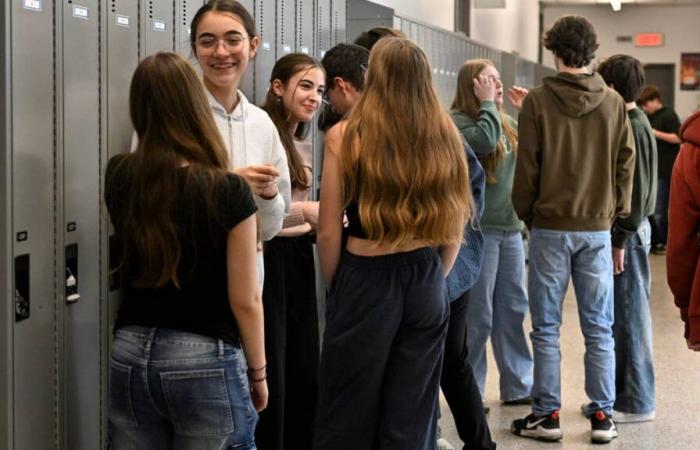OKA | Oka secondary school has become a real living laboratory since the start of the school year, with a complete ban on cell phones, including at lunchtime and during breaks. This major shift was implemented easily, according to staff members, even if several teens do not agree.
• Also read: Another Quebec school wants to restrict the use of cell phones
• Also read: Locked pockets to prohibit cell phones at all times in a secondary school
“We didn’t really know what to expect, but the whole school team took care of it, and ultimately, it’s not complicated at all,” says the special education technician, Kathleen Gauthier, met at outside the school during a lunchtime supervision period.
For their part, teachers notice that their students find it easier to concentrate during lessons. “I really noticed a difference,” says mathematics teacher Amina Aramis.
The school director, Isabelle Martel, is delighted with this “successful” transition, even if it remains realistic.
“We won’t play ostrich, I know there are some who use their cell phones even if it’s not allowed,” she says. But we don’t see any telephones in the school. The majority respects the rule. So yes, we achieved our objective.”
It was not even necessary to use the magnetic pockets to lock the devices, which the school had purchased, she adds.
Only around ten recalcitrant young people, who have had their cell phones in their hands pinched a few times, have to drop off their devices at reception when they arrive in the morning, before picking them up again at the end of the day.
The vast majority have found other ways to occupy themselves during dinner time. Participation in extracurricular activities, which have been enhanced, has skyrocketed. The dances organized on Friday lunchtime in the auditorium are full.
“Our teenagers have adapted really well,” says Mme Martel.
Staff members at Oka high school made signs to encourage teens to “get off” their cell phones.
MARTIN ALARIE / JOURNAL DE MONTREAL
Frustrated teenagers
But not everyone is of the same opinion. When passing the Journal at this school during lunchtime a few weeks ago, students had a lot to say on the subject.
Especially those in secondary school, who don’t understand why they now have to give up their device, after using it daily for four years.
“I’m totally against it,” says Rose, 17, who always has her cell phone with her. She is not the only one, several teenagers hide in the toilets to use it, she says.
Among the recriminations that come up most often, according to the thirty teenagers with whom The Journal spoke: not being able to communicate easily with his parents or friends at another school, not being able to listen to music during the day, not being able to take photos of himself and… wasting time during school time dinner to “look for each other” with friends in the school.
First secondary students are also “frustrated” by the new rule. “I waited all of my primary school to be able to use my cell phone, now I’m in secondary school and I can’t use it anymore. It’s pocketable,” says David, aged 12.
Several young people claim to be breaking the rule, but at the same time admit to being less glued to their screen than before.
More “fun” lunches
The ban also has its good sides, other students say.
“This summer, I was a little angry when I learned that, but in the end, it’s true that we don’t talk to each other anymore, it’s fun,” says Béatrice, a fourth-year secondary student.
Other students are also delighted, since they have “learned to know themselves better”, while getting involved in new activities.
Jérémy, 16, admits to being “dependent” on his cell phone, “like many young people from [s]a generation”. “I find that tough let them take that away from us,” he says, while adding in the same breath that the ban could be beneficial for his little sister.
“Maybe it’s okay […] help him” to be less addicted, he lets it go.
However, we will have to wait a few years before having a better idea of the impacts of such a measure. A team from the CIUSSS was mandated to document the situation.
“We will have the complete overview in five years,” says Isabelle Martel. But we are already seeing results.”
Oka secondary school: here are the rules in place since the start of the school year
Cell phones are completely prohibited upon arrival at school in the morning, during breaks, at lunch time and outside on school grounds.
A device is confiscated as soon as a young person is caught using it at school, the student can recover it at the end of the day.
Students who do it again (generally after three times) must leave their cell phone at reception in the morning before collecting it at the end of the day, which is the case for around ten adolescents out of 1,100 students.
The staff also decided to follow suit to set an example.
The offer of extracurricular activities at lunchtime has been considerably improved, and participation has skyrocketed.
Do you have any information to share with us about this story?
Write to us at or call us directly at 1 800-63SCOOP.






